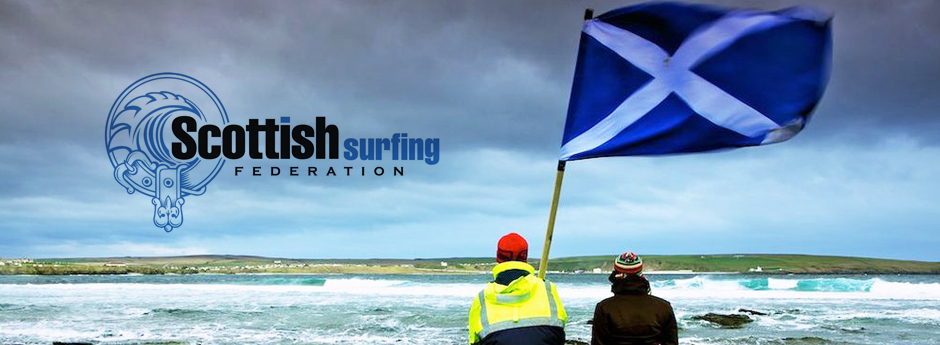Introduction
In some of the harshest sea conditions in the world the Scottish Surfing Federation have safely navigated the sport of surfing around Scotland’s coasts for nearly 4 centuries.
There is recognition that many of the learning’s and past history of the SSF have become entrained in those whom have directed, pioneered and steered its course.
This manuscript sets out to document the SSFs course identifying pitfalls, achievements and milestones which have mapped its journey around Scotland’s seas.
The historic account plots the flood and ebb of the SSF over the years with information supplied from Iain Masson, Peter Strachan, Malcolm Findlay, Sam Christopherson and Andy Bennetts to name a few of the early buccaneers.
The more recent history has been accounted for by William Watson and Chris Noble both of whom served at the helm of the SSF committee between 2006 and 2012.
It is hoped such a historic reference may benefit future adventurers and enthusiasts alike, lighting the way to successfully guide the SSFs course in the years to come. Tales of treasure, treachery, bar brawls, looting and other piracy crimes shall remain reserved to the seafarers whom are fortunate enough to have sailed on the voyages to date.
The Early Pioneers (1960’s-1975)
Surfing first started in Scotland on the East Coast in the mid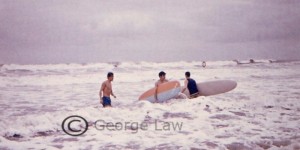 to late 1960s with small groups of surfers forming around the Fraserburgh, Aberdeen and Edinburgh regions. Of the earliest surf club developments there was a “Scottish Surf Club”, run by George Raynes based out of Glasgow followed by a thriving “Pease Bay Surf Club”. From these early surfers Scotland had teams at the Eurosurf 1971 (Jersey) and 1973 (Woolacombe) events.
to late 1960s with small groups of surfers forming around the Fraserburgh, Aberdeen and Edinburgh regions. Of the earliest surf club developments there was a “Scottish Surf Club”, run by George Raynes based out of Glasgow followed by a thriving “Pease Bay Surf Club”. From these early surfers Scotland had teams at the Eurosurf 1971 (Jersey) and 1973 (Woolacombe) events.
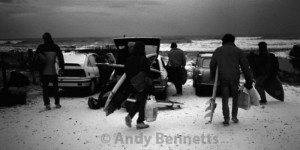 The first Scottish Championships were held at Bettyhill (near Thurso) in 1973 which was mainly attended by the ‘Pease Bay Surf Club’. Two years later in 1975 the Scottish Surfing Championships were held at Fraserburgh and the event attracted competitors from all over Scotland. With an aim of maintaining links with other likeminded individuals from across the country the decision was made to form the a national association and the 1975 Scottish Championships set the cornerstone for the development of the Scottish Surfing Federation (SSF).
The first Scottish Championships were held at Bettyhill (near Thurso) in 1973 which was mainly attended by the ‘Pease Bay Surf Club’. Two years later in 1975 the Scottish Surfing Championships were held at Fraserburgh and the event attracted competitors from all over Scotland. With an aim of maintaining links with other likeminded individuals from across the country the decision was made to form the a national association and the 1975 Scottish Championships set the cornerstone for the development of the Scottish Surfing Federation (SSF).
The Golden Era of Exploration (1975 – 1985)
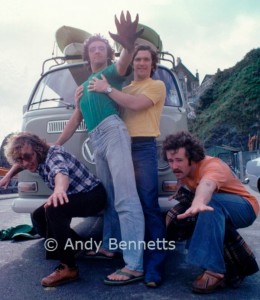 The Scottish Surfing Championships began to “rotate” from 1976 between Fraserburgh, Pease Bay and Thurso. When the event came back to Fraserburgh in 1978, there was the top surfers in Europe at the time up as judges (Nigel Semmens and Steve Daniel to name but two) and the surf photographer, Alex Williams wrote an article for Atlantic Surfer, the UK surfing magazine of the era.
The Scottish Surfing Championships began to “rotate” from 1976 between Fraserburgh, Pease Bay and Thurso. When the event came back to Fraserburgh in 1978, there was the top surfers in Europe at the time up as judges (Nigel Semmens and Steve Daniel to name but two) and the surf photographer, Alex Williams wrote an article for Atlantic Surfer, the UK surfing magazine of the era.
The Scottish Surf Team to Eurosurf 1975, in France had representation from across Scotland. After that, Scotland was properly represented at every Eurosurf until 1995. Between 1975 and 1989, the Scottish Surfing Federation was largely run by older and experienced people, notably Billy Batten, Andy Bennetts, Ian Wishart from ‘Pease Bay Club’, Davie Long and Brad Robertson from Kirkintilloch, Malcolm Findlay, Billy Duncan, Iain Masson from Fraserburgh, Pat Keiran, Barbara Wilson, and Sheila Finlayson from Thurso. Meetings were held quarterly with there being a President, Secretary, Treasurer and representatives from the North, North East, South East and South West. Scotland was always represented on the British Surfing Association (BSA) Executive Committee.
T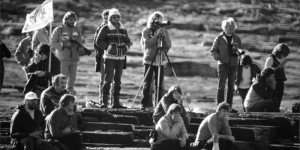 he “Golden Age” of the SSF was during the late 1970s and early 1980’s. Membership grew; there was a lively, regular and well-organised regime of events. Scotland hosted a very succesful Eurosurf in 1981, under the presidency of Bill Batten who was a superb President (as well as an international standard surf judge).
he “Golden Age” of the SSF was during the late 1970s and early 1980’s. Membership grew; there was a lively, regular and well-organised regime of events. Scotland hosted a very succesful Eurosurf in 1981, under the presidency of Bill Batten who was a superb President (as well as an international standard surf judge).
Stormy Waters (1985 – 1999)
By the mid 1980s many of the early pioneers of the SSF had run their course. They had been at the helm several years, overachieved what they had orginally set out to do leaving Scotland punching well above its weight amongst European surf communities. Gradually family, personal and business reasons grew in priority and as such many decided to take a back seat from the SSF ship wheel.
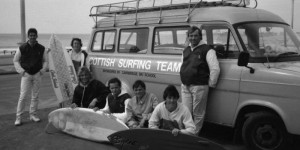 A number of younger people put themselves up for important tasks in the Federation after that and much of the accent shifted from the South East to the North East. David Long from Kirkintilloch was the exception, acting as President into the early 1990s. Iain Masson valiantly took on the job of running the British Championships in Fraserburgh in 1992. Sponsors were found for the event and though the surf wasn’t great, the event was successfully run.
A number of younger people put themselves up for important tasks in the Federation after that and much of the accent shifted from the South East to the North East. David Long from Kirkintilloch was the exception, acting as President into the early 1990s. Iain Masson valiantly took on the job of running the British Championships in Fraserburgh in 1992. Sponsors were found for the event and though the surf wasn’t great, the event was successfully run.
Scotland took on the job of running Eurosurf in 1993. A key player was Gordon Wheeler, who worked tirelessly during the event to make it work. A Managing Committee was formed and a company set up to run the event. Conditions for the event were atrocious, the car park became a mudbath and the surf was generally messy and poor quality. By the end of the contest, most of the teams couldn’t get out of Thurso quick enough.
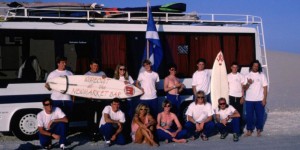 Communication began to break down (during the 1980s there was regular newsletters) and the Federation income declined. Many of the broader activities that the Federation had been involved with gradually eroded throughout the late 1980s and 1990s which in turn reduced membership interest. By the late 1990s, the last of the older experienced individuals had run their course and the management of the Federation moved towards a few enthusiastic younger surfing individuals. As the SSF had expanded over the years it developed financial commitments. Financing surf teams to compete at British and international competitions took a significant load on the SSFs finances, this resulted in the same ‘elite’ benefiting from the SSF but the broader surfing population having little in return.
Communication began to break down (during the 1980s there was regular newsletters) and the Federation income declined. Many of the broader activities that the Federation had been involved with gradually eroded throughout the late 1980s and 1990s which in turn reduced membership interest. By the late 1990s, the last of the older experienced individuals had run their course and the management of the Federation moved towards a few enthusiastic younger surfing individuals. As the SSF had expanded over the years it developed financial commitments. Financing surf teams to compete at British and international competitions took a significant load on the SSFs finances, this resulted in the same ‘elite’ benefiting from the SSF but the broader surfing population having little in return.
Shipwrecked (1999 – 2005)
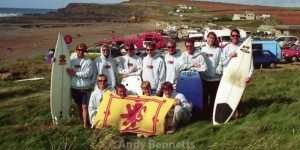 With a declining membership the money starved SSF were struggling to finance competing in the European Surfing Federation. The SSF needed to go professional to support such financial demands therefore it required more members and more sponsorship. The SSF couldn’t afford it and had a choice to go the route of Ireland surfing and welcome the likes of Guinness as the sports backers and its mainstream popularity or say no and withdraw. Sam Christopherson, the SSF president at the time, proposed the the various options in 1999 at the AGM and the overall consensus at the time by the members was that the sport would benefit from further development on a local basis.
With a declining membership the money starved SSF were struggling to finance competing in the European Surfing Federation. The SSF needed to go professional to support such financial demands therefore it required more members and more sponsorship. The SSF couldn’t afford it and had a choice to go the route of Ireland surfing and welcome the likes of Guinness as the sports backers and its mainstream popularity or say no and withdraw. Sam Christopherson, the SSF president at the time, proposed the the various options in 1999 at the AGM and the overall consensus at the time by the members was that the sport would benefit from further development on a local basis.
Indeed between 1999 and 2005 the wave of change came and the sport of surfing developed growing significantly at each of the main Scottish Surfing destinations. Influences through the UK media, surf competitions, surf videos, surf photos, surf shops, surf schools, surf clubs, surf websites, surf guides, better wetsuits, word of mouth and probably the biggest advance the internet prompted accelerated growth albeit there just has no organization guiding its growth nationally. By late 2004 given the growth that had been seen and lack of national direction it wasn’t long before surfers from areas such as Thurso, Fraserburgh and Edinburgh once again began to review the status of the SSF and investigating the possibility of whether it may be restarted.
Rebuilding the boat (2005 – 2006)
In August 2005 a newly formed surf club in Banff hosted the first Scottish Championship in over 5 years. Due to the swell conditions the Open, Ladies and Longboard events were moved to Thurso and held in 3-4ft challenging surf. The event attracted a lot of attention and it was an excellent opportunity for surfers across Scotland both old and new to meet up.
In a similar fashion that had been noted in the early 1970s. After the Championships many of the surfers who took part from across Scotland re-established common networks. It was agreed by all that there should be a Scottish Surfing Team Event where the Scottish surfers unite, compete, socialize and discuss the future of the sport in Scotland together - and so it was decided to hold “Gathering of the Clans 2005”.
The Gathering of the Clans was created to do just that, unite the Scottish Surfing Communities through a surfing community to decide the future fate of Scottish Surfing. The competition was pulled together at short notice with the help of the ‘Broch Surf Club’ and attracted some 70 competitors from across Scotland, sponsorship was offered directly by Granite Reef who also had built and donated the memorial Highland Quiche for the winning clan.
The meeting held at the Gathering of the Clans event took place in Cheers Bar Fraserburgh (November 2005). William Watson gave the background of the event and outlined what developments had taken place in Scottish Surfing since the 6 years previous. It had been rumoured at the time that O’Neill were looking at holding a World Qualifying Series event in Thurso, at the time there had been no event of such scale held within Scotland. A decision was presented to the surfers at the meeting as to whether the Scottish Surfing Federation should be restarted or closed down completely.
The vote was in favor of the reformation of the Scottish Surfing Federation. Damon Hewlett, Chris Noble and William Watson represting the South East, North Coast and North East regions respectively were voted forward to establish what would be needed to reform the SSF and make contact with those planning to organise the WQS.
The World Qualifying Series event was held by O’Neill in April 2005. In May 2006 the Scottish Surfing Championships were held at Fraserburgh. At the event Chris Noble, Damon Hewlett and William Watson were officially swore in as President, Secretary and Treasurer.
Later that year the Gathering of the Clans event took place in Thurso – a further successfully held and well received contest by all Scottish Surfers present. By this point the SSF was once again water tight and was ready once again to set sail supporting the sport around Scotland’s Coasts.
Setting Sail on a new journey (2006 – Present)
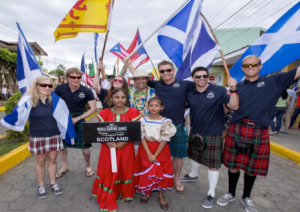 Since 2006 the SSF began going from strength to strength. The SSF have been supporting the Scottish surf communities on a number of areas from beach clean ups, acting as an environmental stakeholder through to youth and surf school development. The two events the SSF aim to hold on an annual basis ‘ The Scottish Surfing Championships’ and ‘The Gathering of the Clans’ have also helped bind the national surfing identity and allowed the SSF to carve out its role as the main focal point for the sport within the country. In 2014 the SSF was formally recognised by SportScotland as the governing body for the Sport within Scotland. In addition strengthening bonds with the ISA (International Surfing Association) and the ESF (European Surfing Federation) the SSF is now leading the way in cold water surfing performance.
Since 2006 the SSF began going from strength to strength. The SSF have been supporting the Scottish surf communities on a number of areas from beach clean ups, acting as an environmental stakeholder through to youth and surf school development. The two events the SSF aim to hold on an annual basis ‘ The Scottish Surfing Championships’ and ‘The Gathering of the Clans’ have also helped bind the national surfing identity and allowed the SSF to carve out its role as the main focal point for the sport within the country. In 2014 the SSF was formally recognised by SportScotland as the governing body for the Sport within Scotland. In addition strengthening bonds with the ISA (International Surfing Association) and the ESF (European Surfing Federation) the SSF is now leading the way in cold water surfing performance.
